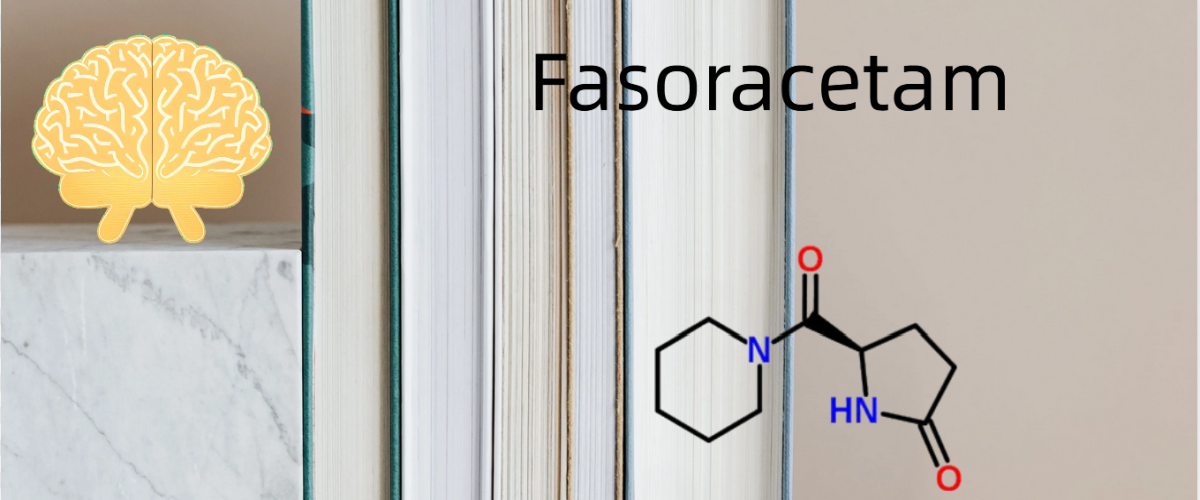In today's fast-paced world, mental clarity has become a highly sought-after state of mind. In the midst of the constant bombardment of information and the many distractions we face, finding moments of peace and absolute focus can feel like a luxury. However, maintaining a clear head is critical to increasing productivity, reducing stress and making informed decisions.
Whether it is life or work, a clear mind is needed. Having a clear mind can help individuals make better decisions, organize their thoughts in time, cultivate positive thoughts, and cultivate healthy work and life balance. Can reduce a certain amount of life stress. Having a clear mind gradually unlocks the potential of our thoughts for optimal focus and clarity of thought.
Fasoracetam was originally developed in the early 1990s as a potential treatment for vascular dementia, a disease that causes cognitive decline due to decreased blood flow to the brain. However, its favorable effects on cognitive function, memory and attention soon made it an attractive candidate for wider use.
It belongs to the class of racemates, a group of synthetic compounds known to enhance brain function and improve memory.
One of the main mechanisms of action of Fasoracetam is its ability to modulate receptors for the neurotransmitter gamma-aminobutyric acid (GABA) in the brain. GABA acts as an inhibitory neurotransmitter that regulates the excitability of neurons in the brain. By affecting GABA receptors, Fasoracetam is thought to enhance the release of GABA, which produces a calming effect and may improve cognitive function.
Overall, Fasoracetam is a nootropic compound that holds promise for cognitive enhancement and potential therapeutic applications. Its ability to modulate GABA receptors may help improve focus, attention, and potentially mood regulation. While more research is needed to fully understand its long-term effects and optimal dosage, Fasoracetam presents an interesting avenue for those looking to unleash their cognitive potential.
Fasoracetam is a nootropic compound that belongs to the family of racemates. It was originally developed to treat certain cognitive disorders, but has gained attention for its potential benefits in enhancing focus and concentration. Fasoracetam works by modulating certain receptors in the brain, including glutamate and GABA receptors, which play a critical role in cognitive function.
Improve concentration:
One of the main benefits of Fasoracetam is its ability to improve attention span. Research shows that Fasoracetam increases the release of acetylcholine, a neurotransmitter associated with attention and learning. By increasing acetylcholine levels, Fasoracetam can improve the brain's ability to focus and maintain attention, which is especially beneficial for those who have difficulty maintaining concentration for long periods of time.
Enhances memory and learning:
Fasoracetam's positive effects on attention and concentration also extend to memory and learning. By optimizing glutamate receptors in the brain, Fasoracetam improves synaptic function, thereby strengthening neural connections. Increased neuroplasticity can dramatically improve memory formation and retention, making it easier to absorb and recall information.
Reduce Anxiety and Stress:
Anxiety and stress can negatively affect concentration and focus. Fasoracetam reduces anxiety by actively modulating GABA receptors in the brain. GABA is an inhibitory neurotransmitter that promotes relaxation and reduces stress. By modulating GABA activity, Fasoracetam may relieve anxiety and stress, allowing individuals to better focus on the task at hand.
Promotes clear thinking:
Another notable benefit of Fasoracetam is its ability to promote clear thinking. This compound helps stabilize and balance brain activity, reducing mental fog and allowing for clear thinking. This mental clarity improves overall cognitive function and decision-making, allowing users to maintain focus and focus more effectively.
Fasoracetam is a member of the racemate family, a group of compounds known for their cognitive-enhancing properties. While its exact mechanism of action is not fully understood, research suggests that Fasoracetam may work by modulating the production and release of certain neurotransmitters, such as GABA and glutamate. It is widely believed to affect cognitive processes such as memory formation and emotion regulation.
Other popular nootropics:
1. Piracetam: Piracetam is often considered the granddaddy of nootropics and was first synthesized in the 1960s. It is known for enhancing memory and promoting overall brain health. However, its apparent effects may be smaller than those of newer nootropics such as Fasoracetam.
2. Modafinil: Modafinil is mainly used to promote wakefulness and combat excessive daytime sleepiness. It is favored by individuals looking to improve focus and focus over extended periods of time, such as students or professionals with demanding workloads.
3. Alpha-GPC: Alpha-GPC is a choline compound that is essential for brain health and function. It is involved in the synthesis of acetylcholine, a neurotransmitter critical for learning and memory. Alpha-GPC may improve cognitive performance and has been studied for its potential to treat cognitive decline.
One of the key advantages of Fasoracetam is its potential ability to increase levels of brain-derived neurotrophic factor (BDNF), a protein that plays a vital role in promoting neuronal growth and overall brain health. Higher BDNF levels are associated with enhanced cognitive performance and reduced risk of neurodegenerative diseases. Fasoracetam's ability to promote neuroplasticity, the brain's ability to adapt and reorganize itself, sets it apart from other nootropics.
Find the right candidate:
Choosing the ideal nootropic depends largely on your specific cognitive needs and goals. Here are a few factors to consider:
1. Expected Effects: Assess what you hope to achieve with your nootropic drug. Are you looking to improve memory, mental clarity, focus or mood? Fasopiracetam may be an excellent choice for supporting mood regulation, while Fasoracetam may be an even better choice for memory enhancement.
2. Tolerance and Sensitivity: Due to differences in brain chemistry, individuals may respond differently to various nootropics. Consulting with a healthcare professional and trying different options can help determine which compound is more effective for you.
3.Stackability: Many nootropic users engage in stacking, which involves combining different compounds to achieve synergistic effects. Fasoracetam often comes in stacked form due to its compatibility with other nootropics.
Find the best dosage:
Determining the correct dosage of Fasoracetam is critical to experiencing its potential benefits without experiencing side effects. As with any nootropic, it is recommended to start with the lowest effective dose and gradually increase it as needed.
Typically, Fasoracetam is available in powder or capsule form, it is worth noting that the effects of Fasoracetam may take a while to appear, so patience is key.
The daily usage limit of Fasoracetam should not exceed 80mg, as exceeding this threshold may cause adverse side effects. It is recommended to consult a medical professional before taking higher doses or if you have any underlying medical conditions.
Potential side effects:
As with any nootropic drug, Fasoracetam may cause side effects, although side effects tend to be mild and rare. It is crucial to monitor the body's response during use. Some common side effects include:
1. Headache: This is the most common side effect of Fasoracetam. However, it is usually short-lived and wanes as the body adapts to the compound.
2. Insomnia: Some users reported difficulty falling asleep after taking Fasoracetam. It is recommended to take the compound earlier in the day or reduce the dose if you experience this side effect.
3. Gastrointestinal upset: In rare cases, users have reported stomach upset, diarrhea, or nausea. If these symptoms persist, it is recommended to discontinue use or reduce the dose.
4. Mood changes: Although uncommon, users have reported temporary restlessness or anxiety while taking Fasoracetam. Consultation with a healthcare professional is advised if these symptoms occur.
Q: How should Fasoracetam be taken?
A: The recommended dosage of Fasoracetam can vary depending on individual needs and tolerance. It is typically taken orally in the form of capsules or powder. It is advised to follow the dosage instructions provided by the manufacturer or consult a healthcare professional for personalized guidance.
Q: Can Fasoracetam be used in combination with other supplements or medications?
A: Fasoracetam may interact with certain medications and substances, so it is important to consult a healthcare professional before combining it with other supplements or medications. This is especially important for individuals who are already taking medications for attention deficit disorders or other cognitive conditions.
Disclaimer: This article is for informational purposes only and should not be considered medical advice. Always consult a healthcare professional before using any supplements or changing your healthcare regimen.
Post time: Aug-09-2023








